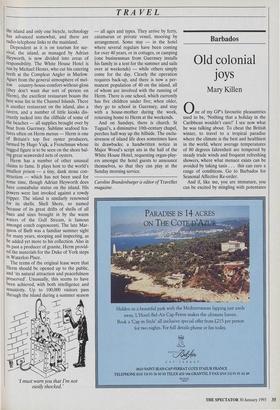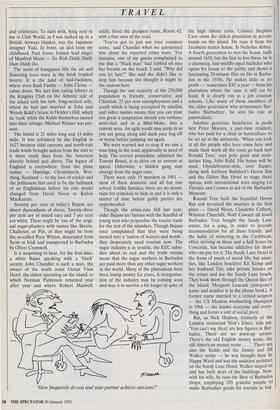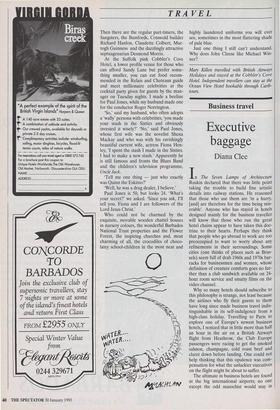Barbados
Old colonial Joys
Mary Killen 0 ne of my GP's favourite pleasantries used to be, 'Nothing that a holiday in the Caribbean wouldn't cure!' I see now what he was talking about. To cheat the British winter, to travel to a tropical paradise where the climate is the best and healthiest in the world, where average temperatures of SO degrees fahrenheit are tempered by steady trade winds and frequent refreshing showers, where what menace exists can be avoided by taking taxis . . . this can cure a range of conditions. Go to Barbados for Seasonal Affective Re-order.
And if, like me, you are immature, you can be excited by mingling with potentates and celebrities. To start with, lying next to me in Club World, as I was tucked up in a British Airways blanket, was the Japanese designer Yuki. In front, an idol from my childhood, Paul Jones, former lead singer of Manfred Mann — Do Wah Diddy Diddy Dum Diddy Do.
The scent of frangipani fills the air and flowering trees wave in the brisk tropical breeze. It is the land of laid-backness, where even Basil Fawlty — John Cleese calms down. We met him eating lobster in the Kingsley Club on the Atlantic side of the island with his new, long-necked wife, whom he had just married at John and Wendy Kidd's house in Holder's Hill, which he `took' while the Kidds themselves moved into their cottage. Michael Winner was pre- sent.
The island is 21 miles long and 14 miles wide. It was colonised by the English in 1627 because tidal currents and north-east trade winds brought sailors from the east to it more easily than from the Americas directly behind and above. The legacy of England is everywhere: from the place names — Hastings, Christchurch, Wor- thing, Scotland — to the love of cricket and the politeness that used to be the hallmark of an Englishman before his role model changed from David Niven to Kelvin MacKenzie.
Seventy per cent of today's Bajans are direct descendants of slaves. Twenty-three per cent are of mixed race and 7 per cent are white. These might be 'out of' the origi- nal sugar-planters with names like Skeete, Challenor, or Pile, or they might be from the so-called Poor Whites, descended from Scots or Irish and transported to Barbados by Oliver Cromwell.
It is surprising to hear, for the first time, a white Bajan speaking with a 'black' accent. John Chandler is such a man, the owner of the south coast Ocean View Hotel, the oldest operating on the island, to which Norman Parkinson returned year after year and where Robert Maxwell, oddly, hired the cheapest room, Room 42, with a fine view of the road.
`You've got to just use your common sense,' said Chandler when we questioned him about the reported crime wave. 'For instance, one of my guests complained to me that a "black man" had rubbed oil into her breasts on the beach. I said, "Why did you let him?" She said she didn't like to stop him because she thought it might be the custom here.'
Though the vast majority of the 250,000 population is friendly, conservative and Christian, 25 per cent unemployment and a youth which is being corrupted by satellite and video nasties means that you can pose too great a temptation should you venture, semi-clad and in a Mini-Moke, into a remote area. An agile youth may jump in as you are going along and slash your bag off or worse before jumping out again.
We were warned not to stop if we saw a man lying in the road, apparently in need of help. The correct procedure, admitted the Tourist Board, is to drive on or reverse at speed. Otherwise, a hidden gang may emerge from the sugar cane.
There were only 19 murders in 1991 most of them domestic and all but one solved. Unlike Jamaica, there are no moun- tains for criminals to hide in and it is only a matter of time before guilty parties are apprehended.
Though the crime-rate fell last year, older Bajans are furious with the handful of young men who jeopardise the tourist trade for the rest of the islanders. Though Bajans once complained that they were being turned into a 'nation of waiters and maids', they desperately need tourism now. The sugar industry is in trouble, the EEC subsi- dies about to end and the trade unions mean that the sugar workers in Barbados are paid more than any other sugar workers in the world. Many of the plantations have been losing money for years. A reorganisa- tion of the industry may be coming soon and may it to survive a bit longer in spite of
`How frequently do you and your partner achieve sarcasm?' the high labour costs. Colonel Stephen Cave owns the oldest plantation in private hands on the island. He runs it from his Jacobean manor house, St Nicholas Abbey. A fourth generation to own the house, built around 1650, but the first to live there, he is a charming, late-middle-aged bachelor who opens his house to the public and shows a fascinating 20-minute film on life in Barba- dos in the 1930s. He makes little or no profit — 'sometimes $30' a year — from his plantation where the cane is still cut by hand. It is clearly run as a job creation scheme. Like many of those members of the older generation who pronounces Bar- bados `Barbadoze', he sees his role as paternalistic.
Another generous benefactor is pools heir Peter Moores, a part-time resident, who has paid for a chair in horticulture to be set up at the university. 'When you look at all the people who have come here and made their mark all the roots go back into Ronald Tree,' says polo giant and mois- turiser king, John Kidd. His house will be used, Glyndebourne-style, over Easter, along with Anthony Bamford's Heron Bay and the Glitter Bay Hotel to stage three operas, with international stars singing La Traviata and Carmen in aid of the Barbados Museum.
Ronald Tree built the beautiful Heron Bay and recruited the smarties in the first place — David Niven, Claudette Colbert, Winston Churchill, Noel Coward all loved Barbados. Tree bought the Sandy Lane estate, for a song, in order to provide accommodation for all these friends, and the habit of wintering in the Caribbean, often arriving in three and a half hours by Concorde, has become addictive for those who can pay for it. The Sandy Lane Hotel is the focus of much of social life, but smar- ties, like London hoteliere Kit Kemp and her husband Tim, take private houses on the estate and use the Sandy Lane beach. They book them through the Queen Bee of the island, Margaret Leacock (everyone's name and number is in the phone book). A former nurse married to a retired surgeon — the US Masters windsurfing champion in 1986 — she knows everyone and every- thing and forms a sort of social pivot.
But, as Nick Hudson, formerly of the London restaurant Nick's Diner, tells me, `You can't say there are key figures in Bar- bados. There are no sewn-up scenes. There's the old English money scene, the old American money scene . . . ' There are also the Kidds and the Jimmy and Jill Walker scene — he was brought here by Happy Ward and was the assistant architect on the Sandy Lane Hotel. Walker stayed on and has built most of the buildings. Now, with his wife, he runs the Best of Barbados shops, employing 105 grateful people to make Barbadian goods for tourists to buy'.
Then there are the regular part-timers, the Sangsters, the Bamfords, Cotswold builder Richard Hanlon, Claudette Colbert, Mur- togh Guinness and the dazzlingly attractive septuagenarian Desmond Morris.
At the Suffolk pink Cobbler's Cove Hotel, a lower profile venue for those who can afford Sandy Lane but prefer some- thing smaller, you can eat food recom- mended in the Relais and Chateaux guide and meet millionaire celebrities at the cocktail party given for guests by the man- ager on Tuesday nights. I made a beeline for Paul Jones, while my husband made one for the conductor Roger Norrington.
`So,' said my husband, who often adopts a 'wally' persona with celebrities, 'you made your stash in the Sixties and obviously invested it wisely?' No,' said Paul Jones, whose first wife was the novelist Shena Mackay and who was with his ravishingly beautiful current wife, actress Fiona Hen- ley, 'I spent the stash I made in the Sixties. I had to make a new stash.' Apparently he is still famous and fronts the Blues Band and the children's television programme, Uncle Jack.
`Tell me one thing — just who exactly was Quinn the Eskimo?'
`Well, he was a drug dealer, I believe.'
Paul Jones is 50, but looks 24. 'What's your secret?' we asked. 'Since you ask, I'll tell you. Fiona and I are followers of the Lord Jesus Christ.'
Who could not be charmed by the exquisite, movable wooden chattel houses in nursery colours, the wonderful Barbados National Trust properties and the Flower Forest, the inspiring churches and, most charming of all, the crocodiles of choco- latey school-children in the most neat and highly laundered uniforms you will ever see, sometimes in the most flattering shade of pale blue.
Just one thing I still can't understand. Why does John Cleese like Michael Win- ner?
Mary Killen travelled with British Airways Holidays and stayed at the Cobbler's Cove Hotel. Independent travellers can stay at the Ocean View Hotel bookable through Carib- tours.












































































 Previous page
Previous page